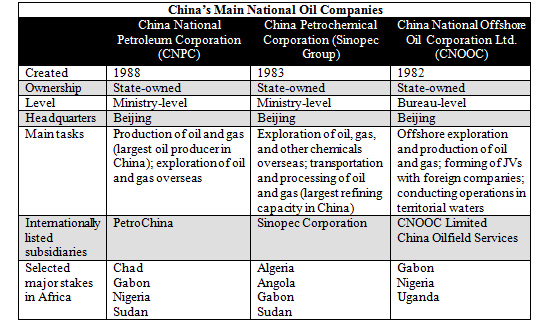China’s Energy Strategy and the Role of Gov’t Oil in Africa
By Shelly Zhao
 May 3 – In a follow up to last month’s article “The Geopolitics of China-African Oil,” this article looks at the players in foreign policy on oil and, in particular, the role of Chinese national oil companies (NOCs), as well as potential opportunities for foreign businesses. Some of the main questions addressed are: Who are the main players in China’s African oil strategy? Are the NOCs really arms of the state? What opportunities exist for foreign companies in Africa?
May 3 – In a follow up to last month’s article “The Geopolitics of China-African Oil,” this article looks at the players in foreign policy on oil and, in particular, the role of Chinese national oil companies (NOCs), as well as potential opportunities for foreign businesses. Some of the main questions addressed are: Who are the main players in China’s African oil strategy? Are the NOCs really arms of the state? What opportunities exist for foreign companies in Africa?
China’s energy strategy
China’s diversification strategy is key for energy security and seeks to be comprehensive and maneuverable. In terms of oil, it is particularly significant in the short- and medium-term. There appear to be a few main areas of China’s energy strategy that take into account short-term as well as long-term considerations:
- Domestic exploration and extraction of non-renewable resources such as coal, oil and natural gas, as well as refining the fossil fuels for use (short to medium-term).
- Exploration and production of non-renewable resources, including exploration of potential new reserves as well as building of pipelines and other key infrastructure for transport (short to medium-term).
- Construction of renewable energy infrastructure, which include hydropower, solar, wind, and nuclear (medium to long-term).
- Investment and research for efficiency and sustainability, which targets both non-renewable resources, renewable resources, as well as negative externalities such as environmental degradation and waste management (medium to long-term). This is also emphasized in the 12th Five-Year Plan.
In the short to medium-term, fossil fuels will continue to play a crucial role in China’s energy security. In addition to extraction, China also aims to secure a long-term presence in African states in order to gain continued access to these resources. Since fossil fuels are finite and polluting energy resources, the Chinese leadership is also concurrently developing greener renewable energy sources for its long-term strategy.
China energy security and Africa
Given the importance of oil in China’s energy security, there has been much discussion regarding oil’s role in Chinese foreign policy. China’s main energy strategy in Africa emphasizes securing overseas contracts for exploration and extraction. Historically, the development of the oil industry in Africa required technologies and necessitated outside presence. In particular, the upstream business – exploration and production – continues to see large foreign investors. For China, this means generous investment infrastructure projects, for which oil-rich African states give oil as payment. A few of the consequences and perspectives are:
- Increased demand for foreign oil and relationships with oil-producing states. China is a net importer of oil and its oil imports are only expected to increase in the future. Heinrich Kreft has said that the trend of China’s dependence on fuel imports “is irreversible.” China’s energy demands mean strategic ties are needed with oil-producing states – not only with African governments, but also with governments in the Middle East, Latin America, Central Asia, and Southeast Asia.
- Increased pluralism and strengthened role of oil players in the foreign policy process. Kenneth Lieberthal and Michel Oksenberg’s “fragmented authoritarianism” model of policymaking examines the growing political pluralism, competition between players, and challenges of coordination in Chinese foreign policy. The NOCs in China’s energy security will most likely become more influential as they pursue their own corporate interests.
- Energy insecurity and vulnerability may encourage neo-mercantilist, zero-sum approaches to energy acquisition. Some scholars say that since energy resources are crucial for China’s national security interests and survival, energy connects with issues such as regime legitimacy and governance as well. Other risks include the possibility of price changes and oil shortages. Edward Steinfeld has said energy has become “central to the issue of good governance” while Heinrich Kreft argued that energy is “a key factor in maintaining the Party’s leading role and keeping it firmly in control,” and sees this leading to a neo-mercantilist approach to gaining non-renewable energy resources overseas.
- China’s energy policy benefits developing countries, and the threat is overstated. There is also the argument that China’s role in oil-supplying countries is beneficial for their market and industrialization, as well as the export of oil that has been extracted with Chinese infrastructure investment.
- Less room for ethical behavior? Whether China’s rise will be peaceful and whether China will adhere to a “responsible player” role has been a point of much debate. China’s aggressive energy strategy has lead scholars such as David Zweig and Bi Jianhai to observe in 2005 that China has a “resource-based foreign policy” that “has little room for morality.” Scholars such as Ian Taylor have also pointed out that the domestic non-interference policy is an important question in regards to stability in states such as Sudan.
Oil continues to be a significant component of Sino-African foreign relations; in the context of energy insecurity, China has developed friendly relations with oil-supplying states, sometimes regardless of the internal ramifications in the country. China also appears to incorporate oil as part of the broader diplomatic and economic relationship. Sino-African trade has increased considerably over the past decade, and China sometimes links oil with infrastructure and other aid in “package deals.” It is important, though, that these observations be contextualized, since China has varying degrees of influence in different countries in Africa, and African NOCs and Western international oil companies still play enormous roles.
Main players in oil
Resource acquisition is the main push for China’s Africa strategy. The government remains the most significant player that pushes to secure oil and other resources. A number of commissions and ministries under the State Council work in China’s oil strategy in Africa, as it is inextricably linked to its economic growth and national security. The National Development and Reform Commission (NDRC), formerly called the State Development Planning Commission, focuses on administration and formulation of plans for economic growth. It coordinates strategies and manages China’s oil reserves as well as approves overseas resource acquisition (e.g. The Global Times recently reported that the NDRC approved 2 billion tons of iron ore purchases by the Wuhan Iron & Steel Group in Madagascar.)
The Ministry of Commerce (MOFCOM) formulates trade policy and plays a role in approving investment, aid, and loan packages to Africa. A number of departments work together to coordinate Africa policy, including the Department of West Asia and African Affairs and the Department of Foreign Aid. The MOFCOM also coordinates with the Export-Import Bank on loans and projects in Africa, while the Ministry of Foreign Affairs focuses on diplomacy and works to expand China’s bilateral relationships with African countries.
China’s national oil companies are influential state-owned enterprises (SOEs) that dominate the oil industry in China, and among the largest oil companies in the world. The State-owned Assets Supervision and Administration Commission under the State Council manages these SOEs and appoint the leadership of the NOCs. The three main NOCs are China National Petroleum Corporation (CNPC), China Petroleum & Chemical Corporation (Sinopec), and China National Offshore Oil Corporation Ltd. (CNOOC). CNPC and Sinopec focus on a range of production and exploration (Sinopec more so on downstream), while the smaller CNOOC is more oriented toward overseas acquisition. Below is a comparison chart of China’s main NOCs.

National oil companies – Arms of the state or independent entities?
China’s three major oil companies are state-owned and have state financial backing. The role of the government vis-à-vis the NOCs has been subject to much interest and debate. While there is government push for energy resource acquisition, the NOCs also behave much like private corporations and pursue their own objectives. The interaction between the Party-State and the NOCs is an interesting one, in which the players can exert influence and are subject to mutual pressures.

The NOCs have a large degree of autonomy and do not always act at the behest of the state. Bates Gill and James Reilly wrote in their 2007 article “The Tenuous Hold of China Inc. in Africa” that the State Council agencies such as MOFCOM and MOFA do not have much authority or overseas influence over the NOCs. A February 2011 report by the International Energy Agency also found that the NOCs have a great deal of independence. Far from being arms of the government, the NOCs are profit-driven in their commercial interests. Erica Downs of the Brookings Institution, who has written extensively on NOCs, also pointed out at a Center for Strategic and International Studies event in October 2010 that China’s NOCs are lobbyists who have a powerful political role and often gain a “sympathetic ear” from the NDRC in pursuing their company interests.
Scholars have pointed out the tensions between the government and the NOCs, as well as between the NOCs themselves. The NOCs were created to obtain oil supplies for the country, but the state has encouraged commercial pursuit of interests. China’s NOCs also compete with each other to secure resources and increase influence at home. The IEA report noted that managers of the NOCs wear “two hats” and must balance their state and corporate roles. Because the NOCs have relatively narrow interests, their actions can have unintended impacts for Chinese foreign policy. For example, the actions of the NOCs abroad – for example, in Angola and Sudan – can affect international perceptions of China’s role in Africa, and these issues also concern China’s political and diplomatic relationships with their African partners. Being self-interested and foreign investment-oriented entities, as well as an interest group with autonomy, the NOCs have potential to provide both benefits and challenges for the Chinese government.
Opportunities for foreign businesses in Africa
Chinese NOCs may seek to establish ties with other firms, including Western firms, in order to expand their global reach, which can take the form of JVs. However, Chinese oil companies still seek to increase competitiveness vis-à-vis international oil companies. China likely sees more risk in bidding for Western firms as well, a lesson gained from CNOOC’s unsuccessful 2005 bid for the U.S.-based oil company Unocal.
Even though the role of Chinese NOCs seems to be expanding in Africa, Western international oil companies are still the dominant foreign players in Africa, both in terms of asset holdings and production quantities. Some of the major plays are Royal Dutch Shell (UK/Netherlands), BP (UK), Eni (Italy), ChevronTexaco (U.S.), Exxon Mobil (U.S.), and Total (France). The exceptions are projects in Sudan and Nigeria, for example, where China has a larger stake. African NOCs enjoy significant power as well, and many African countries remain open to investment from Western companies.
Related Reading
The China-Angola Partnership: A Case Study of China’s Oil Relationships with African Nations
The Geopolitics of China-African Oil
China Goes to Africa as New Dynamics Emerge
Africa to Get US$10 Billion in Loans from China
China’s Africa Strategy Blossoms as Relationship Develops
- Previous Article New Issue of China Briefing: The FCPA and its Impact on China-Based Subsidiaries
- Next Article China Briefing Releases New Representative Office Guide


























